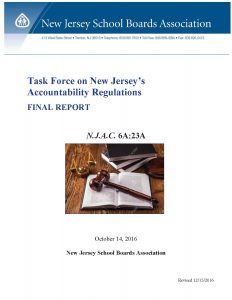The Accountability Regulations: NJSBA Final Report
NJSBA's Task Force on New Jersey's Accountability Regulations makes 63 recommendations to promote school district efficiency and accountability—without the red tape and excessive restrictions.
In November 2015, in preparation for the sunset of New Jersey’s Accountability Regulations (N.J.A.C. 6A:23A), NJSBA President Donald Webster, Jr. and Executive Director Dr. Lawrence S. Feinsod created a task force to identify needed changes in the code. The regulations are now scheduled to sunset in May 2017.
“Our goal is to make sure that the new regulations promote responsible action and accountability, but do not handcuff school boards and their administrative staffs with red tape, restrictions and additional expense,” explained Dr. Feinsod. The Accountability Regulations address the superintendent salary cap, conditions for the receipt of state aid, travel policies and procedures, and numerous other areas.

APPENDICES
A – History of Accountability Regulations
B – Results of Survey of Local School Officials
D – Education Transformation Task Force Recommendations on the Accountability Regulations
E – Leadership for Education Excellence Analysis and Recommendations
F – New Jersey Association of School Business Officials Recommendations
G – Study of the Impact of the Salary Cap on Chief School Administrators (NJSBA)
I – Proposed Re-adoption with Amendments: N.J.A.C. 6A:23A-1 through 15 (N.J. Department of Education)
The NJSBA Task Force included local school board members; resource persons representing the state’s executive county school business administrators and the New Jersey Association of School Business Officials; local school district administrators, and NJSBA staff members. It was chaired by Michael Kaelber, NJSBA director of legal and labor relations services.
The Final Report of the Task Force on New Jersey’s Accountability Regulations contains 63 recommendations designed to ensure responsible and efficient operations in our public schools, without placing excessive administrative and/or financial burdens on local school districts.